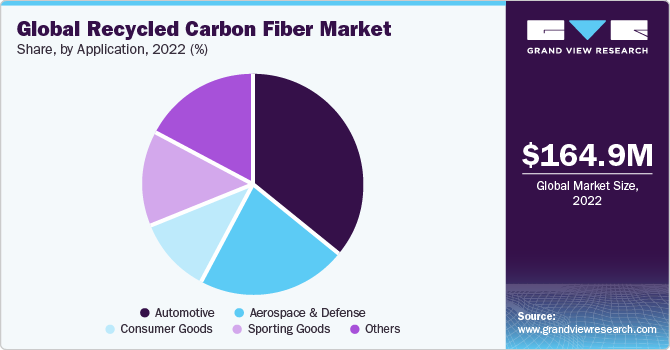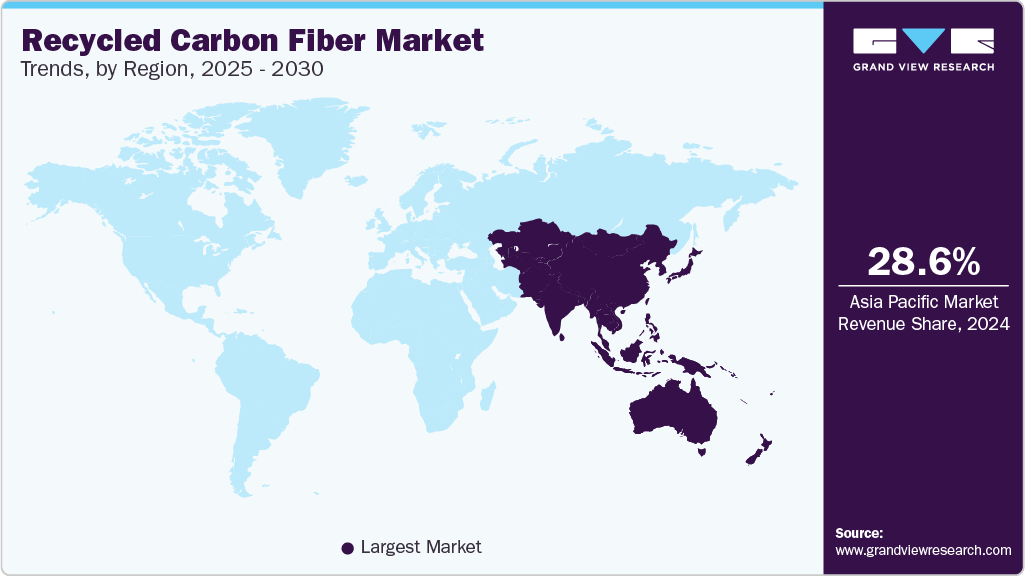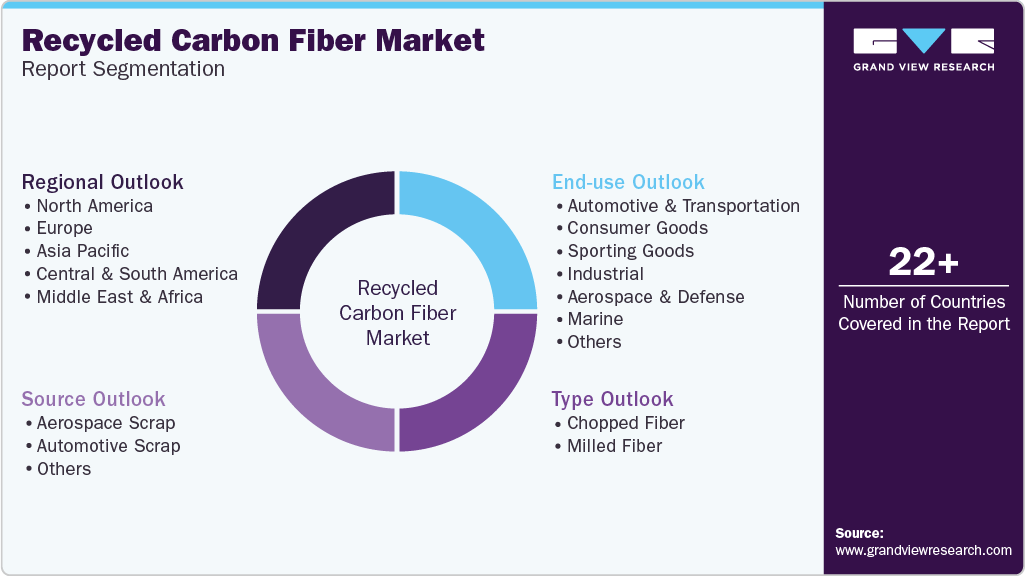- Home
- »
- Advanced Interior Materials
- »
-
Recycled Carbon Fiber Market Size & Share Report, 2030GVR Report cover
![Recycled Carbon Fiber Market Size, Share & Trends Report]()
Recycled Carbon Fiber Market Size, Share & Trends Analysis Report By Application (Automotive, Aerospace & Defense, Consumer Goods, Sporting Goods), By Region, And Segment Forecasts, 2023 - 2030
- Report ID: GVR-4-68040-142-5
- Number of Report Pages: 98
- Format: PDF, Horizon Databook
- Historical Range: 2018 - 2021
- Forecast Period: 2023 - 2030
- Industry: Advanced Materials
Recycled Carbon Fiber Market Size & Trends
The global recycled carbon fiber market size was estimated at USD 164.9 million in 2022 and is expected to expand at a compound annual growth rate (CAGR) of 10.9% from 2023 to 2030. The market is driven by the rising demand for recycled carbon fiber in the automotive, aerospace, and defense industries. The automotive sector has a strong emphasis on reducing vehicle weight to enhance fuel efficiency and reduce emissions. Lightweight materials, including carbon fiber, offer an effective solution as they help automakers meet stringent fuel efficiency standards while maintaining safety and performance. Recycled carbon fiber, with its excellent strength-to-weight ratio, serves as an attractive alternative to traditional materials like steel and aluminum.

Moreover, rapid urbanization in both developed and developing economies, including the U.S., China, and India, has resulted in increasing government spending on the building & construction sectors to establish a variety of prospective infrastructure projects. These factors are expected to drive demand for recycled carbon fiber in the expanding building and construction industry. The U.S. is expected to witness significant growth on account of increasing environmental concerns, cost-effectiveness, and performance requirements. With increasing awareness regarding climate change and environmental conservation, there is a strong emphasis on reducing CO2 emissions and minimizing waste in the country.
Application Insights
Based on application, the automotive industry led the market with the largest revenue share of 36.2% in 2022 and is expected to grow at a significant CAGR during the forecast period. A rise in fuel prices has driven the need for fuel-efficient vehicles. Automotive manufacturers are focusing on improving the fuel efficiency of vehicles by reducing their overall weight. Recycled carbon fiber composites offer excellent mechanical properties, such as high tensile strength and stiffness. This makes them ideal for various automotive applications, including body panels, chassis components, and interior parts. Moreover, this can be engineered to meet specific performance requirements, allowing automakers to tailor material properties to their needs.

This flexibility in material design contributes to its adoption in diverse automotive applications. The aerospace and defense industry plays a significant role in driving the demand for recycled carbon fiber due to several critical factors, including its low weight for higher fuel efficiency and cost efficiency. The aerospace & defense industries are cost-sensitive, and any material used must offer value. Recycled carbon fiber often presents a cost-effective alternative to conventional virgin carbon fiber due to lower material procurement costs and energy savings during manufacturing. Furthermore, several governments and regulatory bodies around the world are imposing stricter emissions and environmental standards to reduce CO2 emissions.
This material supports sustainability goals by recycling materials, reducing waste, and minimizing the carbon footprint of manufacturing processes. Sporting goods manufacturers are increasingly adopting sustainable practices and eco-friendly materials to meet consumer demand for environmentally responsible products. It diverts carbon fiber waste from landfills and reduces the need for virgin carbon fiber, which has a larger carbon footprint. It also helps dampen vibrations, providing a smoother feel and enhanced comfort for athletes. This is particularly beneficial in sports equipment, such as tennis rackets, where reducing vibration can improve playability and performance.
Regional Insights
On the basis of region, Asia Pacific dominated the global market with a revenue share of 49% in 2022 and is estimated to grow at a significant CAGR over the forecast period. The Asia Pacific region has witnessed significant growth in the automotive industry, driven by rising income levels of the middle-class population, rapid urbanization, and increasing consumer demand for vehicles. As the automotive industry expands in countries including China, Japan, South Korea, and India, the demand for lightweight and eco-friendly materials, such as recycled carbon fiber, is likely to increase to enhance fuel efficiency and meet emissions standards.

The growing aerospace industry in Europe and North America, combined with stringent government regulations, is providing significant benefits to the market. Europe and North America have well-established and growing aerospace industries, with major players, such as Airbus, Boeing, Lockheed Martin, and Northrop Grumman headquartered in these regions. The demand for commercial and military aircraft is steadily increasing in response to factors like air travel growth, defense needs, and technological advancements. Fuel efficiency is a major concern for the aerospace industry due to its direct impact on operating costs, environmental sustainability, and compliance with emissions regulations.
Using recycled carbon fiber composites in aircraft structures helps reduce overall weight while maintaining or even improving structural integrity. This leads to substantial fuel savings and reduced greenhouse gas emissions. Europe and North America both have stringent environmental and safety regulations governing the aerospace industry. These regulations aim to reduce environmental impact, ensure passenger safety, and maintain the industry's global competitiveness. Product usage supports these sustainability goals by reducing waste, minimizing the environmental footprint of manufacturing, and conserving resources.
Key Companies & Market Share Insights
The key players are focused on increasing their market share by adopting various strategies, such as new product launches, research and development, mergers & acquisitions, and collaborations. The established players have a strong presence in the market as they possess extensive experience advanced technologies, and a wide range of applications. Leading companies are actively diversifying product applications beyond traditional sectors, such as aerospace & defense and automotive. They explore opportunities in wind energy, sporting goods, construction, and consumer electronics.
Key Recycled Carbon Fiber Companies:
- Toray Industries, Inc.
- Mitsubishi Chemical Holdings Corporation
- Procotex Corporation SA
- Carbon Fiber Remanufacturing
- Sigmatex
- Gen 2 Carbon Limited
- SGL Carbon
- Teijin Group
- Carbon Conversions
- Alpha Recyclage Composites
Recycled Carbon Fiber Market Report Scope
Report Attribute
Details
Market size value in 2023
USD 193.0 million
Revenue forecast in 2030
USD 398.2 million
Growth rate
CAGR of 10.9% from 2023 to 2030
Base year for estimation
2022
Historical data
2018 - 2021
Forecast period
2023 - 2030
Quantitative units
Revenue in USD million/billion and CAGR from 2023 to 2030
Report coverage
Revenue forecast, company ranking, competitive landscape, growth factors, trends
Segments covered
Application and region
Regional scope
North America; Europe; Asia Pacific; Central & South America; Middle East & Africa
Country scope
U.S.; Canada; Mexico; Germany; UK; France; Italy; Spain; China; India; Japan; South Korea; Brazil; Saudi Arabia
Key companies profiled
Toray Industries Inc.; Mitsubishi Chemical Holdings Corporation; Procotex Corporation SA; Carbon Fiber Remanufacturing; Sigmatex; Gen 2 Carbon Limited; SGL Carbon; Teijin Group; Carbon Conversions; Alpha Recyclage Composites
Customization scope
Free report customization (equivalent up to 8 analysts working days) with purchase. Addition or alteration to country, regional & segment scope
Pricing and purchase options
Avail customized purchase options to meet your exact research needs. Explore purchase options
Global Recycled Carbon Fiber Market Report Segmentation
This report forecasts revenue growth at global, regional, and country levels and provides an analysis of the latest trends in each of the sub-segments from 2018 to 2030. For this study, Grand View Research has segmented the global recycled carbon fiber market report on the basis of application and region:

-
Application Outlook (Revenue, USD Million, 2018 - 2030)
-
Automotive
-
Aerospace & Defense
-
Consumer Goods
-
Sporting Goods
-
Others
-
-
Regional Outlook (Revenue, USD Million, 2018 - 2030)
-
North America
-
U.S.
-
Canada
-
Mexico
-
-
Europe
-
Germany
-
UK
-
France
-
Spain
-
Italy
-
-
Asia Pacific
-
China
-
India
-
Japan
-
South Korea
-
-
Central & South America
-
Brazil
-
-
Middle East & Africa
-
Saudi Arabia
-
-
Frequently Asked Questions About This Report
b. The global recycled carbon fiber market size was estimated at USD 164.9 million in 2022 and is expected to reach USD 193.0 million in 2023.
b. The global recycled carbon fiber market is expected to grow at a compound annual growth rate of 10.9% from 2023 to 2030 to reach USD 398.2 million by 2030.
b. The automotive application segment dominated the recycled carbon fiber market with a market share of 36.2% in 2022. This is on account of growing use of lightweight materials including recycled carbon fiber in building vehicles to improve efficiency and reduce carbon emissions.
b. Some of the key players operating in the recycled carbon fiber market include Toray Industries Inc., Mitsubishi Chemical Holdings Corporation, Procotex Corporation SA, Carbon Fiber Remanufacturing, Sigmatex, Gen 2 Carbon Limited, SGL Carbon, Teijin Group, Carbon Conversions, Alpha Recyclage Composites
b. The key factors that are driving the Recycled Carbon Fiber market include the growing automotive and aerospace & defense industries in the developing countries.
Share this report with your colleague or friend.
![gvr icn]()
NEED A CUSTOM REPORT?
We can customize every report - free of charge - including purchasing stand-alone sections or country-level reports, as well as offer affordable discounts for start-ups & universities. Contact us now
![Certified Icon]()
We are GDPR and CCPA compliant! Your transaction & personal information is safe and secure. For more details, please read our privacy policy.
We are committed towards customer satisfaction, and quality service.
"The quality of research they have done for us has been excellent."





